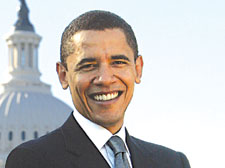|
|
 |
e
| |
Yes we can! Unlocking the science of success
Tipping Point author Malcolm Gladwell turns his attention to the elusive X-factor that separates the talented from the successful. By Gerald Isaaman
Outliers: The Story of Success.
By Malcolm Gladwell. Allen Lane £16.99
ALONGSIDE such iconic titles as Silent Spring, The Hidden Persuaders and A Brief History of Time, Malcolm Gladwell’s The Tipping Point ranks among the top 10 books that have changed how the world thinks.
And although the title of his latest book doesn’t have the charisma of Blink!, his earlier work, Outliers: The Story of Success, is undoubtedly welcome at a time when we are groaning with the misery of economic and social collapse.
Perhaps a snappier title would have been “Obama the Outlier”, but the book was researched and written before the new American president came to power and Barack Obama is not among Gladwell’s subjects.
Nonetheless, his theory can easily be applied to – and tested against – the world’s most recent, high-profile success story.
Gladwell has a spectacular ability to root out facts, in this case how people have attained success, and he delves into what – apart from luck – exceptionally successful people have in common.
Bill Gates is his typical example of an “outlier”.
His school in Seattle had a computer club offering him experience unavailable to most teenagers, which, aged 13, he grabbed and turned to his advantage by becoming the whizz kid of programming.
He had spent more than 10,000 hours as a programmer by the time he was 20. With that knowledge and experience, drive and ambition, he became the king of Microsoft, and one of the world’s wealthiest and most influential men.
Gladwell cites The Beatles as another example, their smash-hit arrival in America being backed by seven years’ playing and composing together, determined to go on even when they spent awful nights performing in a Hamburg strip club.
John Lennon explained: “We got better and got more confidence. We couldn’t help it with all the experience of playing all night long.
“It was handy them being foreign. We had to try even harder, put our hearts and souls into it, to get ourselves over.”
Then there is the outstanding Jewish lawyer Joe Flom – fat, ugly and from a deprived immigrant family – who was so ostracised that he was forced to take on legal work others hated. As a result, he became the expert in dealing with hostile takeovers, and ended up becoming rich, admired and famous and a senior partner in a Manhattan practice employing 2,000 lawyers.
Similarly, Obama forged his own success from the deprived background of growing up without a father, first winning a scholarship to a private school, then gaining two prestigious law degrees, promotion and success in his profession as the first black president of the Law Review, until he entered the world of politics.
Indeed, Gladwell argues that when we try to understand success we normally start with the wrong question. We ask “What is this person like?” when we should really be asking “Where are they from?”
It is the environment and culture of your early days that are significant and whether you waste your time or not when opportunity stares you in the face.
You do have to work for success, though, obviously, family support can be a key factor, and ride all the risks.
This fourth book follows much the same pattern as Gladwell’s previous ones, finding individual stories that can form the basis for his theories, in this case with some directly political rather than psychological overtones.
Much of it may sound like common sense but underlying it all is the optimism and sense of hope he engenders, probably originating from his own outlier success as a British-born writer of mixed race who emigrated to Canada, quickly made his mark as a journalist, and now, at 42, is one of the New Yorker magazine’s star performers, as well as a much sought-after public speaker.
He has an inquiring and incisive mind, asking corporations: “Did it never occur to you that, if everyone has to think outside the box, maybe it is the box that needs fixing?”
He believes in human nature, the environment in which it flourishes, and declares: “I’m by nature an optimist. I can’t remember the last time I wrote a story which could be described as despairing.”
In today’s embattled world, it is an engaging philosophy. Hence the Obama effect. What will we do if all that hope fails?
|
 |
|
|
 |
 |
|
 |
|


